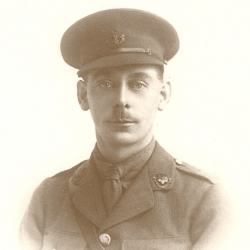Bernard Harold Brister was born in Dublin on September 14, 1887. His father, Joseph Charles Brister, was a stockbroker. Bernard was the youngest of 3 sons and also had 3 younger sisters. The family and a domestic servant were living in Chorlton-cum-Hardy by 1901. He was educated at William Hulme’s Grammar School, Manchester from April 1899 to December 1903. In 1910 he traveled to Brazil and resided there for 4 years before returning to the UK in May 1914. While in Brazil he had been employed as a bookkeeper.
He enlisted in the Duke of Lancasters Own Yeomanry, in Manchester, on September 1, 1914 and was discharged after 100 days when he was given permission to transfer to the King Edward’s Horse, a cavalry regiment. He joined the 1st Battalion King Edward’s Horse on December 9, 1914, in Watford, as an enlisted man and was subsequently discharged to a commission on June 9, 1915. He was commissioned into the 9th Battalion Manchester Regiment (Territorial Force) on June 10, 1915.
On October 13, 1915 he embarked on His Majesty’s Transport Ship Scotian at Devonport for Gallipoli with 10 other Officers, arriving at Mudros on October 24th and joined the Battalion on Cape Helles on October 26, 1915.
He sailed with the Battalion to Egypt, arriving on January 18, 1916 and temporarily became acting Transport Officer when Lt. Shatwell reported sick. He came down with Malaria on March 5, 1916 and went to the Government Hospital at Suez for treatment. He became dangerously ill with suspected typhoid in April and, although recovered, the medical board found him to be unfit for general service. While waiting to return to the UK he contracted “Malta Fever” (Brucellosis) and was admitted to the Nasreih Schools Hospital in Cairo on May 18th. Sufficiently recovered to sail, he embarked HS Letitia on May 29, 1916 in Alexandria bound for the UK. Once in the UK he was granted leave to convalesce at home until August 19, 1916.
In August he was medically assessed and sent to the 9th Reserve Battalion Manchester Regiment for home service. Bernard Harold Brister was fluent in Portuguese, having spent 4 years residing abroad prior to the war, and so was assigned as a translator to the British Mission attached to the Portuguese Expeditionary Force in France. During his time in France, he was promoted to Lieutenant, effective July 1, 1917 and mentioned in Sir Douglas Haig’s Despatch of November 7, 1917.
Unfortunately, on October 8, 1917 he was injured in France when he fell from his horse. He was evacuated to the UK on October 21st and admitted to 1st Eastern General Hospital, Cambridge on October 29, 1918 suffering from a contusion to the right hip. He was granted leave from October 21, 1917 to January 1, 1918 to recover at home. He was medically assessed again on January 21st and found to be fit enough to return to France. He rejoined the British Mission on February 13, 1918.
On October 23, 1918 he was taken sick to hospital and evacuated to the UK. Assessed on November 6, 1918 he was once again given leave to recover at home. He was re-assessed on March 18, 1919 and found to be permanently unfit for further military service. He relinquished his commission, retaining the rank of Lieutenant, due to ill health contracted on active service, on May 24, 1919.
After the war he worked as a commercial traveler and traveled internationally. Lt. Bernard Harold Brister died in Manchester on July 25, 1977. He was 89 years old.

